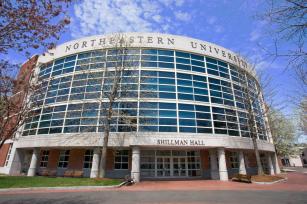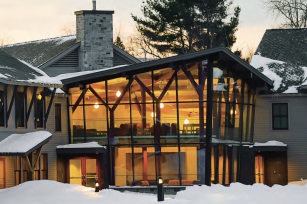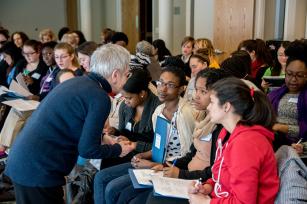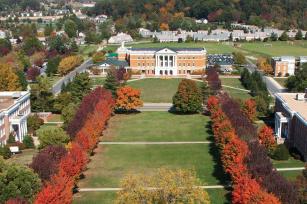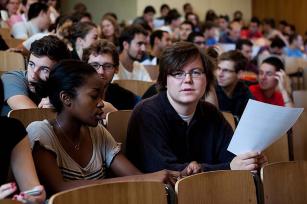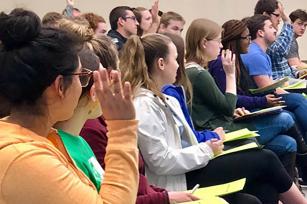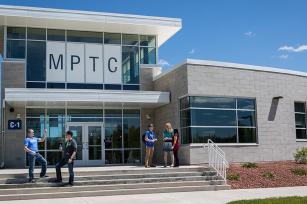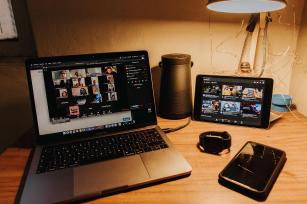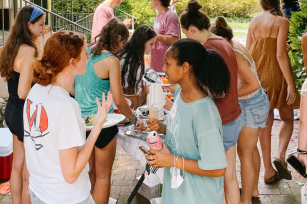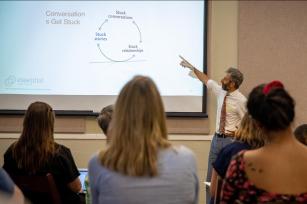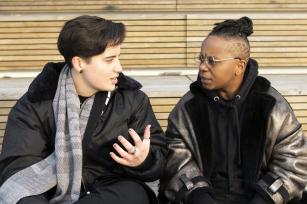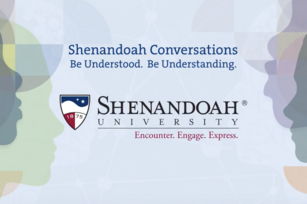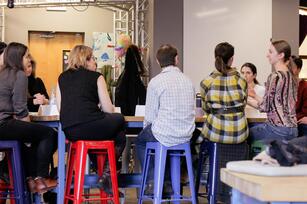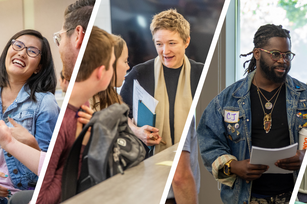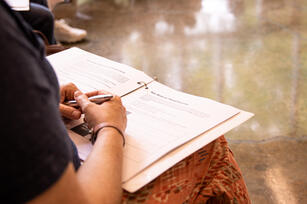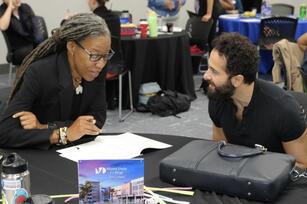
Breadcrumb
- Essential Partners
- Our Impact
- Impact Stories
- Lewis & Clark: Dialogue is Who We Are
Lewis & Clark: Dialogue is Who We Are
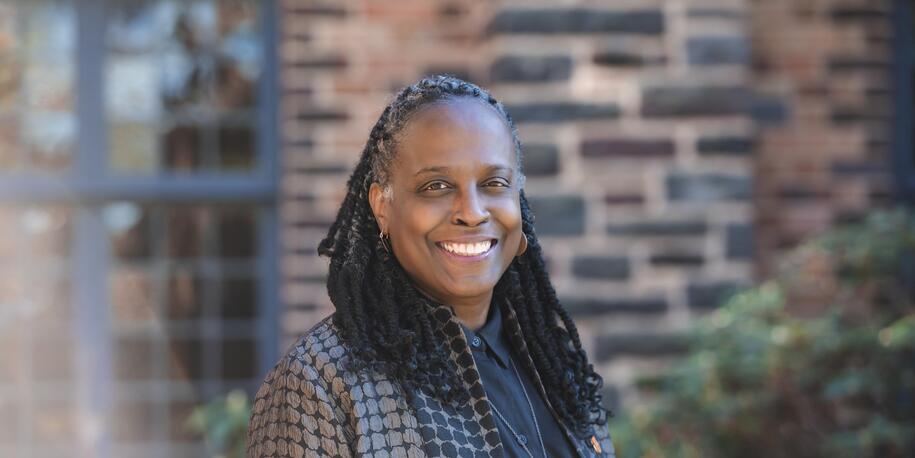
“The ultimate goal of this initiative is for our community to learn and practice dialogue in both formal and informal settings to build our capacity to listen, speak, and learn with each other about topics central to our collective well-being, even when those topics are contentious.”
President Robin Holmes-Sullivan
Lewis & Clark
Visit Lewis & Clark in Portland, Oregon, and you’ll hear faculty, students, staff, and administrators talking with each other in ways you might not hear on all college and university campuses. That’s because Lewis & Clark is so committed to the practice of dialogue that it’s central to the institution’s strategic imperatives. “This is who we are. This is part of being at Lewis & Clark,” says Janet Bixby, the school’s first director of “Community Dialogues.”
Community Dialogues is President Robin Holmes-Sullivan’s signature initiative. “The ultimate goal of this initiative,” President Holmes-Sullivan says, “is for our community to learn and practice dialogue in both formal and informal settings to build our capacity to listen, speak, and learn with each other about topics central to our collective well-being, even when those topics are contentious.”
Lewis & Clark describes itself as “a private institution with a public conscience.” It includes an undergraduate College of Arts and Sciences, a Graduate School of Education and Counseling, and a School of Law. In just over two years of working with Essential Partners, Lewis & Clark has trained 32 faculty members, 12 staff members, and 48 students to facilitate dialogue using EP’s trademark Reflective Structured Dialogue (RSD) approach.
The results of this institutional commitment are tangible: a series of dialogues about Lewis & Clark’s mascot; a groundbreaking course on Palestine and Israel, built on a foundation of dialogic practice; a deepened campus/community environmental studies symposium; a reflective art therapy project; and the integration of RSD throughout myriad aspects of Student Life.
There are also crucial intangible outcomes, such as students who are prepared to bring dialogic skills into their civic and professional lives. Jia Ng, a student who is a trained Community Dialogues facilitator, says, “Personally, Community Dialogues has benefited me a lot. I really grew as a communicator. It’s really helped me improve my public speaking skills and in professional settings. I’m able to converse with neutrality. I can transparently say what I mean.”
Joining Forces: Essential Partners and Community Dialogues
Liberal arts colleges across the country share a tradition of promoting many kinds of dialogue—academic discussions, explorations, and debates. “But in a time of increasing polarization, both in society at large and in higher education right now, it can be very challenging to foster open dialogue in the classroom,” says Bixby, who also served as an associate professor of education and as associate dean of the graduate school of education and counseling.
“Recognizing the problematic dynamics of so much of our public discourse is really powerful—and then having strategies to intervene and prevent that and to promote other kinds of more thoughtful, engaging dialogue is powerful,” Bixby says.
“Essential Partners has the magic sauce—its trainings,” Bixby adds. “Working with Essential Partners and Community Dialogues has enabled us to say, ‘Hey, we have tools to help us be able to do this, and we have ways to do this. We can address these things.’ That's been incredibly useful and powerful.”
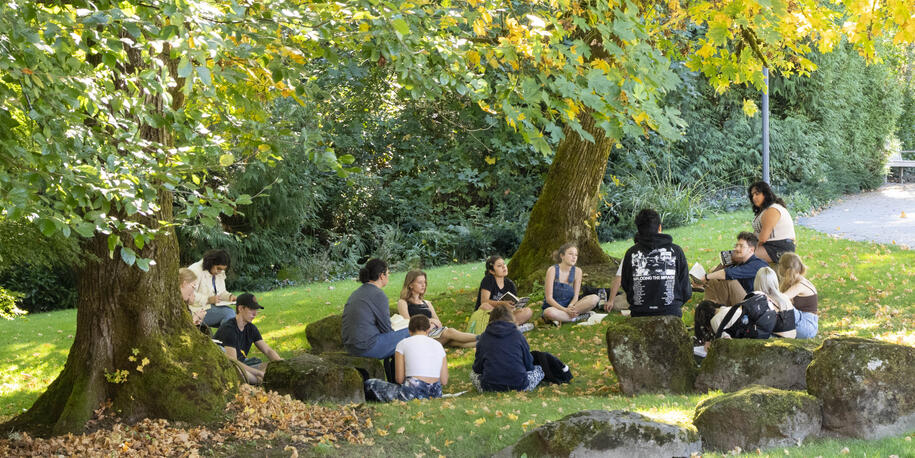
“Essential Partners has the magic sauce—its trainings. Working with Essential Partners and Community Dialogues has enabled us to say, ‘Hey, we have tools to help us be able to do this, and we have ways to do this. We can address these things.’ That's been incredibly useful and powerful.”
Janet Bixby, Director of Community Dialogues
Lewis & Clark
Revisiting the Mascot
Among Lewis & Clark’s early uses of Essential Partners tools was a series of dialogues focused on Lewis & Clark’s mascot, the Pioneers. Many people in the Lewis & Clark community felt it was time for a change, while many others did not see the need for such a change.
Typically, a college might host an open forum to give people a chance to voice their opinions. But with Essential Partners training in its tool belt, the campus decided to host multiple virtual dialogues about the mascot. Alumni from around the country and across the decades along with students, faculty, and staff were able to join facilitated conversations. “They were very open, thoughtful, inquisitive conversations,” Bixby recalls.
Reflecting on this and other contentious topics, Bixby notes, “It’s not uncommon to feel a certain amount of trepidation about controversial issues or big decisions that have to be made where you want community input. You don’t want there to be a lot of antagonism or unnecessary conflict about a major decision or discussion of a particular topic. It’s really powerful to have this set of tools, to say, ‘yeah, we can do that.’”
Understanding Palestine and Israel
As at many campuses, the October 7, 2023, Hamas attack on Israel brought what Bixby calls “tremendous grief and concern” to Lewis & Clark. She says, “We wanted to create a space where people from different perspectives could speak and listen to each other.”
In collaboration with the Community Dialogues office, Oren Kosansky, associate professor of anthropology and director of Middle East and North African Studies, coordinated a campus-wide teach-in. It was attended by about 200 community members. “It wasn’t a dialogue per se,” he recalls, “but we wanted to figure out how to create a teach-in where we knew people would be coming with a variety of different passions and perspectives. We thought about what container we could create to make this go as well as possible.”
But “one teach-in doesn’t change things,” Kosansky says. “It moves the needle a little bit. If you don’t follow it up, then it’s really hard to sustain it. We are not best served in a one-off dialogue. People had to commit to doing a series of dialogues.”
So he and his colleagues proposed a one-credit, dialogue-based course on Palestine and Israel.
Twenty-five undergraduate students enrolled in the course, and numerous faculty members were involved as speakers and discussion leaders. In addition, two undergraduate students who had been trained in RSD were involved as dialogue facilitators.
The course featured three components that were interspersed throughout the term:
- a set of three Reflective Structured Dialogues, utilizing the full Essential Partners model;
- a set of three text-based discussion sessions that were a hybrid of dialogue and analysis, with faculty members serving as guides to understanding the texts; and
- two teach-ins, each of which drew about 100 people from across campus, with faculty speaking on topics and follow-up discussion facilitated by faculty and students who had been trained in the Essential Partners tools.
The teach-ins, says Bixby, were especially powerful. The trained faculty facilitator kicked off the discussion portion by reminding attendees—comprising faculty, staff, and students at all levels—that questions of genuine curiosity were welcome in this learning forum. “People really did that beautifully,” Bixby says. “They asked really thoughtful questions, challenging questions, difficult questions.”
Both Kosansky and Bixby are proud of the work the faculty and Community Dialogues did together on this course.
Kosansky reflects on the impact the course had on students. “There was definitely a sense of gratitude for just creating the space,” he says. “So many students were so personally and emotionally wrought by the situation but felt that there was no space and that talking about it elsewhere was too risky. Students definitely appreciated just the fact that faculty and staff were committed to doing the work.”
Bixby concurs. “We actually addressed head-on this terrible, historical tragedy and ongoing humanitarian crisis,” she says. “We’re an institution of higher education. We should be discussing this in all kinds of ways, and so to be able to do that and know that we could do it in thoughtful, academic ways was really powerful.”

“We want to cultivate genuine curiosity among students so that they really open themselves to the needs of others and also feel like others have an awareness of what their needs and experiences are.”
Ben Meoz, VP for Student Life and Dean of Students
Lewis & Clark
Deepening Student Life
Ben Meoz, vice president for Student Life and dean of students, finds applications for the Essential Partners RSD framework just about everywhere in Student Life.
Although Meoz is deeply experienced in team-building and facilitation techniques, the EP framework’s structure is unlike anything he has experienced before. “I am really excited about how it continues to expand the different ways that we can build community and culture on campus,” he says.
As Lewis & Clark moved to make RSD an integral part of the entire institution, administrators began to realize how important it is to introduce incoming first-year students to the practice.
To do that, RSD has been added to existing orientation activities “by bringing in the sort of prompts we would use in a Reflective Structured Dialogue but without the same risk levels,” Meoz says. “I keep it a little bit lighter but really try to lean into furthering understanding and that genuine curiosity piece.” Prompts include questions about joining a new community, being a part of a community, and identifying the things that help you feel connected.
Another place where Student Life embeds “micro-practices” learned from Essential Partners is in “roommate interviews.” Most campuses have students create “roommate agreements.” Meoz explains that these are typically nonbinding, noncontractual documents that nevertheless feel very formal. “The roommate agreement is a written document between roommates about how they’re going to divvy up the space or the time,” he says. “It’s very transactional.”
At Lewis & Clark, this potentially controversial, high-stakes transaction has been reimagined as a “roommate interview.” Students walk through their preferences and needs. By using dialogic micro-practices, they get beneath the surface of those preferences and needs and say, “Why is that important to you when that isn’t happening?”
A similar practice is used with entire floors in a residence hall as well as the larger community. Meoz says, “We want to cultivate genuine curiosity among students so that they really open themselves to the needs of others and also feel like others have an awareness of what their needs and experiences are.”
Meoz reports that dialogic micro-practices have also become infused throughout Student Life. Full-time professional staff meetings practice the principle of “connect before content,” and student organizations use RSD when they form anew each year and when they face difficult conversations.
From the Classroom to Students’ Future Professions
RSD provides a powerful set of tools to foster dialogue about challenging issues, but at Lewis & Clark, these tools also find their way into students’ own future professional development. They learn these tools experientially, during facilitated dialogues and dialogic classrooms, as well as training on how to use the tools on campus and even how to use them in professional settings.
The ENVX Symposium, hosted by the Environmental Studies department, has a long tradition of bringing together people on all sides of contentious environmental issues—students, faculty, and community members. Bixby says, “This program has always been deeply committed to ensuring that all of our Environmental Studies students know how to be in conversation with people who don’t necessarily agree with them.”
In spring 2025, multistakeholder groups studied issues such as farm animal protection, fire use and prevention, and workers’ rights. The symposium, which will be held during the fall 2025 semester, will bring these working groups together “to try and hammer out some sort of common understanding.”
With the addition of RSD to the ENVX tool kit, says Bixby, the facilitators “model how to bring people together who don’t necessarily think the same to listen to each other, to ask each other questions, to do research together, and then to see where they might find points of agreement.” Bixby concludes, “They're not going to solve the problem, but they are hopefully going to be able to talk across differences and come to some shared understandings of some things.”
Students in the Master’s in Art Therapy program are gaining similar skills. Mary Andrus, assistant professor and art therapy program co-director, wanted to have her art therapy students learn how to promote dialogue around art related to important social issues and how these issues impact community members. They engaged in dialogue prompted by an art project called the “Vision Quilt,” which illustrated community members’ experiences of gun violence.
The resulting RSD, says Bixby, “was a great way for these art therapy students in training to see how this can be done so that they can take that out into their professional lives.”
Understanding Dialogue as Action
Lewis & Clark students are practicing dialogic skills. They’re using them across campus—when they’re in the classroom, when they’re participating in co-curricular events, even when they’re getting to know their roommate. They’re using these skills not just with fellow students and with faculty and administrators but also with community members who have different views.
Some elements of campus life get left behind when students launch. But when L&C students graduate, they carry the skills of RSD into their professional lives and civic engagement. They become leaders who are able to interrupt the dynamics of polarization and build connections across deep differences of identities and perspectives.
Annissa Rhynders, a graduate student in Higher Education Student Affairs, underscores the deeper impact and importance of Reflective Structured Dialogue. “Talking about things is difficult and also super important,” she says. “Talking is doing something. I am beginning to see dialogue as an action and as a tool.”
Related Impact Stories
Testimonials

Megan DeFranzaThere is a need not only for safe space within our churches but for our church leaders who often feel alone, or who may feel their job could be at risk if they engage in controversial conversations. How are they to make safe spaces in their own congregations for healthy dialogue if they rarely experience safe space to do the same?
Gordon College, Massachusetts
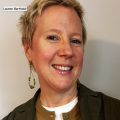
Lauren Barthold, Philosophy FacultyI’ve learned that it is not enough to announce my commitment to dialogue and expect students to know what I mean; I need concrete exercises to allow students to learn how to do it.
Endicott College, Massachusetts

Katie Shear, Civic Engagement CoordinatorUsing what we learned from Essential Partners, staff were able to model effective and respectful communication for students. A next step would be for us to help students employ some of these methods themselves. The staff not only gained skills in communication but also left feeling supported by each other in the work that we do.
Southern Vermont College, VT
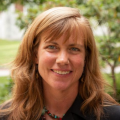
Dr. Jill DeTemple, Religious Studies FacultyAfter using this approach in my classroom, I am now more willing, and more able, to engage students in meaningful conversations about potentially contentious issues. Whereas I used to nod toward things like homosexuality in religious life, interfaith marriage, or the role of government in reproduction, now I build these conversations into the class so students can learn to speak about their experiences, and so they learn to listen and learn from those with whom they might disagree.
Southern Methodist University, Texas

Undergraduate StudentI feel more comfortable participating in class and less defensive when other students disagree. And because I learned more from my fellow students about their views, I now feel less competitive with them than in other classes.
Bridgewater College, Virginia

Undergraduate StudentI have learned how to not be offended and to be better prepared to receive other people's communication. You don't have to agree, but you can respect the other person.
Randolph College (VA)

Program ParticipantI did not anticipate having as many concrete takeaways as I do. I feel there is an immense practical application.

Undergraduate StudentWe tackled really difficult topics and this helped everyone know each other and understand each person's individual perspective. Over the course of the semester, I became much more comfortable engaging with my classmates—specifically because of the peer dialogue groups.
Bridgewater College, Virginia

Lucinda Garcia, Researcher, Educator & AdvocateThe Dialogic Pedagogy Fellowship at Tufts University, in collaboration with Essential Partners, gave me transformative social-emotional learning and facilitation skills to support meaningful dialogue in the classroom. I’m excited to apply what I’ve learned to design questions that invite personal narratives, value-based discussion, and comfort with complexity—all in service of building a classroom climate where productive dialogue and engaged learning can flourish.

Karen Ramirez, Director of the CU Engage ProgramWe get more requests [for campus dialogue] than we could ever respond to.… I’m proud that our work on campus is actually kind of unusual, because it doesn’t support just one population. It supports everyone—students, staff, faculty, graduate students. I don’t know if there are other University of Colorado projects going on that hit all of our campus population.
University of Colorado, Boulder

Undergraduate StudentI learned to expect the best of my classmates, even when we don’t agree. I can’t write off their opinions anymore, despite our disagreements.
Bridgewater College, Virginia

Noga Shemer, Associate Professor in Anthropology“When I started bringing the RSD model into the classroom, it changed everything, and I had this overwhelming sense of what the classroom could be. The student feedback was unlike anything I had seen before. Students said, ‘Wow, why haven’t we had the chance to do this before? And why don’t we get to do this more often in our education?’”
University of Connecticut

Nicki Glasser, Policy CoordinatorWhat surprised me was how much you could transform a relationship during a three-hour conversation.
Transformation Center, Massachusetts

Jamie Kleinman, Associate Professor“I want every STEM class to have a dialogue. Imagine if the students had more practice doing this in more of their classes. It really speaks to the nature of approaching this from a systems perspective and how big a need there is for that.”
Department of Psychological Science, University of Connecticut

Beth MendozaDialogue gets more results. It makes decision-making easier. It makes creating participation easier … our greatest organizational impact has been more contributions as well as more effective and efficient meetings.
Moraine Park Technical College, Wisconsin

Undergraduate StudentAt the beginning of the semester, there was not much participation in class. But by the end, almost everyone had something constructive to add every day.
Bridgewater College, Virginia

Undergraduate StudentAs a pharmacy major, I do not receive much training on how to handle difficult or controversial conversations. I think that this training will help me not only in my duties as a resident assistant, but in discussing medications and therapies with future patients when the conversation becomes difficult.
Northeastern University, MA

Undergraduate StudentDialogue challenged us to think more deeply about the class topics. Talking about our own thoughts and experiences in relation to the topic also challenged us to think about our own views and articulate them more clearly.
Gordon College, Massachusetts

Dr. Brooke Vuckovic, Clinical Professor of Leadership“The Dialogic Classroom is by far and away the most skillful and thoughtful professional development I have had in years as an educator.”
Kellogg School of Management

Kim Davidson, OmbudsI’ve gained not only confidence but tools. The Essential Partners training was worth every penny.
Oberlin College, Ohio

Teresa Grettano, Associate Professor and Director of the First-Year Writing programFacilitated dialogue creates a classroom atmosphere in which exploring uncomfortable issues and asking difficult questions is an expected part of the process, and it allows students space to engage each other without fear of the vitriol common in our public discourse.
University of Scranton (PA)

Elizabeth Zehl, Undergraduate StudentEssential Partners' process gives people the space to be intellectually curious and to engage with others on important issues in a way that also benefits their own understanding of what they believe.
Randolph College (VA)

Anjali Bal, Associate Professor of MarketingWe talked about where we are in the world right now, so we talked quite a bit about polarization. Essential Partners showed how these conversations are becoming more taxing and challenging because of that polarization. These were some first steps in terms of how we can start to have those conversations.
Babson College, MA

Cricket Fuller, The Christian Science MonitorThis wasn’t a policy debate [about guns]. Instead, two people whose backgrounds and views diverged in almost every way possible shared a moment of honesty that struck at the heart of the matter.
Boston, Massachusetts

Janet Lansberry, Weissman Center Assistant DirectorThis was probably the most profound workshop that we ever brought to campus. It offered a really unique foundation in personal insight.
Mount Holyoke College, MA

Anne Hopkins Gross, Dean of StudentsThe Essential Partners workshop was a way of building up our ability to talk about more difficult issues, such as poverty and GLBTQ safe spaces. It was really the foundational entrée into those more challenging issues of race, ethnicity, sexuality, and gender. People walked away feeling much more confident about having difficult conversations.
Southern Vermont College, VT

Alex Lyford, Assistant Professor of StatisticsI can't possibly overstate the positive effects the Dialogic Classroom training had on the curriculum and approach to my Introduction to Data Science class. The difference in the course from a year ago and now is night and day. My lectures are now filled with meaningful discussion and discourse—often related to sensitive topics that I wouldn't have dared touching without the training. Student feedback about these discussions has been overwhelmingly positive, and there is no chance that I would have had the wherewithal or initiative to revamp the course in such a dramatic manner without the training.
Middlebury College

James Rucker, Faculty MemberIt is really different than it was before. The Essential Partners process has given me the power to be heard and be seen. It’s unreal.
Randolph College (VA)

Janet Bixby, Director of Community Dialogues“Essential Partners has the magic sauce—its trainings. Working with Essential Partners and Community Dialogues has enabled us to say, ‘Hey, we have tools to help us be able to do this, and we have ways to do this. We can address these things.’ That's been incredibly useful and powerful.”
Lewis & Clark

Undergraduate StudentI started to trust everyone in the class—I felt heard and I felt that people wanted to listen. As a result, I wasn’t afraid to let my past come out and let people learn from what I have been through.
Bridgewater College, Virginia

Undergraduate StudentIt’s nice to talk about things that we encounter all the time but rarely get talked about. This made me hopeful that there are people who are willing to talk about serious issues.
Dartmouth College, New Hampshire

Undergraduate StudentEvery opinion was accepted. No one felt judged or uncomfortable talking to one another. These have been, by far, the best classroom discussions I have ever had.
Bridgewater College, Virginia

Undergraduate StudentThe most significant thing for me was learning how to ask for more information rather than trying to persuade a person to think differently. I also learned helpful dialogue tips, which are more effective during difficult conversations. If I encounter a difficult dialogue with any of my residents, I plan on using the techniques I learned in this workshop to facilitate those talks.
Northeastern University, MA

Etionette Nshirmirimana, Burundian Master TrainerI realized that by using the “dialogue” approach, people could talk of what is deep in their heart, especially things that have harmed them.
Burundi

Ben Meoz, VP for Student Life and Dean of Students“We want to cultivate genuine curiosity among students so that they really open themselves to the needs of others and also feel like others have an awareness of what their needs and experiences are.”
Lewis & Clark

Bob Bordone, Expert and AuthorEssential Partners does the best work in the field of dialogue and communication.
Harvard Negotiation & Mediation Clinical Program, Co-Founder

Program ParticipantThis is the best adult learning experience I have had in the past five years. I wanted to learn new skills—I did!

Amy Cottrill, Birmingham-Southern CollegeThe past few years in our country have been the most divisive and alienating in my lifetime, which can be a tremendous challenge in the classroom that aims for community, shared experience, and listening with empathy to opinions that are different from one's own. The Essential Partners workshop I attended provided invaluable tools to meet the challenges of teaching today. It helped me reimagine the classroom as a place to help students learn the essential tools of living and learning in community and interconnection, skills that are necessary in every single area of life. I have no doubt that my teaching has been dramatically reshaped in light of my introduction to structured dialogue and I feel like I have so much more to offer my students because of that.
Birmingham, AL

Undergraduate StudentI notice that my classmates take much more care when speaking about people who practice other religions. They make fewer assumptions, and they’re more careful with their words to make sure to avoid unintentional connotations.
Bridgewater College, Virginia

Undergraduate StudentI learned a lot about myself from others’ perspectives—it was comforting to hear similar values and ideas expressed, yet really eye-opening and intriguing to hear very different philosophies.
Dartmouth College, New Hampshire

Anjali Bal, Associate Professor of MarketingOne of the things that we talked about was the ability to hear another person’s point of view, even if our minds aren’t changed. We have to remember that any sort of movement is movement. If we don’t acknowledge small movement, then we just stay on two different sides, and it’s all black and white, and we don’t hear each other.
Babson College, MA

Undergraduate StudentThe professor was able to engage every student. She encouraged them to present new ideas. Dialogue helped create an environment that really deepened the understanding of the material.
Southern Methodist University, Texas

Jonathan Noyalas, Director of the McCormick Civil War Institute“RSD has been the most transformative thing in my 21 years of teaching. … Students have a greater desire to open up in class about things because they know that a Noyalas class is a safe environment. ‘I can say things here. I’m not going to be judged. I understand I’m contributing to a broader conversation.’”
Shenandoah University

Megan DeFranzaHere safe space was created for pastors and church leaders to wrestle with topics like evolution which are all too often “off limits” or believed to be antagonistic to the faith.
Gordon College, Massachusetts

Patrick Hale, director of Multicultural and Identity ProgramsOne of the things that’s so crucial to even fostering dialogue around diversity, equity, and inclusion is creating opportunities for folks to engage in deep reflective self-awareness.
Babson College, MA

Noga Shemer, Associate Professor in Anthropology“Students come to university so they can think deeply about issues that matter. They are the future, and the stakes are high. They want spaces where they can think these things through.”
University of Connecticut

Program ParticipantI felt an amazing sense of accomplishment when the Essential Partners training ended; that I'd done something important for my community and something important for me.
Massachusetts

Undergraduate StudentDuring one dialogue, as we were reading The Joy Luck Club, we were asked to discuss our relationship to America. There were students who grew up in the United States and also those who hadn’t—and I was surprised to hear that everyone had equally complex relationships with the topic.
I appreciated being able to hear and express the full depth of our own context before delving into a discussion about first-generation immigrants.
Gordon College, Massachusetts
